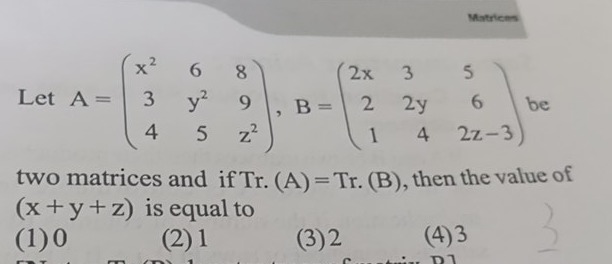Question
Question: Let $A = \begin{pmatrix} x^2 & 6 & 8 \\ 3 & y^2 & 9 \\ 4 & 5 & z^2 \end{pmatrix}$, $B = \begin{pmatr...
Let A=x2346y2589z2, B=2x2132y4562z−3 be two matrices and if Tr. (A) = Tr. (B), then the value of (x+y+z) is equal to

0
1
2
3
3
Solution
Let the given matrices be A=x2346y2589z2 and B=2x2132y4562z−3.
The trace of a square matrix is the sum of the elements on the main diagonal.
The trace of matrix A is Tr(A) = x2+y2+z2.
The trace of matrix B is Tr(B) = 2x+2y+(2z−3).
According to the problem statement, Tr(A) = Tr(B). Therefore, we have the equation: x2+y2+z2=2x+2y+2z−3
Rearrange the terms to one side to form an equation equal to zero: x2−2x+y2−2y+z2−2z+3=0
We can complete the square for the terms involving x, y, and z. For the x terms: x2−2x. We add and subtract (2/2)2=12=1. So, x2−2x+1=(x−1)2. For the y terms: y2−2y. We add and subtract (2/2)2=12=1. So, y2−2y+1=(y−1)2. For the z terms: z2−2z. We add and subtract (2/2)2=12=1. So, z2−2z+1=(z−1)2.
Substitute these completed squares back into the equation: (x2−2x+1)+(y2−2y+1)+(z2−2z+1)=0 This simplifies to: (x−1)2+(y−1)2+(z−1)2=0
Assuming x, y, and z are real numbers, the square of a real number is always non-negative. The sum of non-negative terms is zero if and only if each term is zero. Therefore, we must have: (x−1)2=0⟹x−1=0⟹x=1 (y−1)2=0⟹y−1=0⟹y=1 (z−1)2=0⟹z−1=0⟹z=1
We are asked to find the value of (x+y+z). x + y + z = 1 + 1 + 1 = 3.
